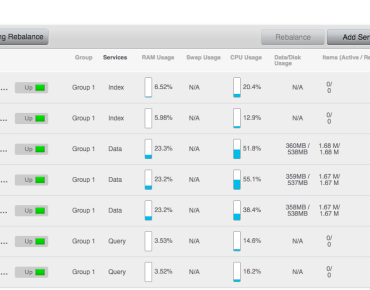Couchbase Releases V4 of NoSQL Database

Couchbase today unveiled the eponymous fourth version of its NoSQL database designed to empower developers in create broader varieties of web, mobile, and Internet of Things applications on Couchbase.
The update provides upgraded levels of developer agility, enterprise application scalability and performance, and business insight from data stored in Couchbase, according to the developer.
"Enterprises are increasingly turning to NoSQL databases for their ability to handle diverse and fast-changing data," said Doug Henschen, vice president and principal analyst at Constellation Research, in a statement. "With its N1QL and multi-dimensional scaling capabilities, Couchbase 4.0 brings SQL-like querying and flexible scalability to the NoSQL market."
Most of Couchbase Server 4.0 offers N1QL – pronounced Nickel – as a new SQL-based query language Couchbase created to allow developers to craft applications with less code and more agility, CEO Bob Wiederhold told EnterpriseTech. Developers also can leverage JSON to nest data in one document or N1QL to model and query data across multiple documents, he added.
"Our query language is SQL-compliant," said Wiederhold. "That's very important because, obviously, both data analysts and data scientists as well as developers have been using SQL to query their databases for the past 40 years. This will lower the barriers … to using NoSQL and more specifically using Couchbase."
This latest release allows standard SQL-based reporting and includes data visualization tools to access data stored in Couchbase. Simba drivers provide ODBC and JDBC connectivity that work with standard SQL 92 and N1QL dialects. Using these tools, organizations can access an array of business intelligence and data visualization tools, such as Microsoft Excel, Tableau, Looker, and Qlik, to reach data stored in Couchbase, the company said.
![Screen Shot 2015-10-02 at 1.44.19 PM[2]](https://www.aiwire.net/wp-content/uploads/2015/10/Screen-Shot-2015-10-02-at-1.44.19-PM21-300x156.png) In addition, new Multi-Dimensional Scaling enhances organizations' ability to provision hardware by allowing systems to scale up or out, Couchbase said. Enterprises, thus, can assign workloads to specific hardware to meet specific performance requirements, Wiederhold explained.
In addition, new Multi-Dimensional Scaling enhances organizations' ability to provision hardware by allowing systems to scale up or out, Couchbase said. Enterprises, thus, can assign workloads to specific hardware to meet specific performance requirements, Wiederhold explained.
By supporting Global Secondary Indexes, Couchbase Server 4.0 further extends the capabilities of multi-dimensional scaling by allowing these indexes to be assigned to specific hardware. As a result, scatter/gather – which can slow query execution – is reduced, thereby boosting performance.
"Multi-dimensional scaling is all about separating those workloads," Wiederhold said. "We can provide much higher performance for each of those use cases."
The third major enhancement involves cross-datacenter replication (XDCR), which is usually used for disaster recovery and high availability, said Wiederhold. Couchbase enhanced its filtering capabilities so enterprises can filter subsets of data for geographic replication without needing to replicate the entire data set between datasets. As a result, data becomes available to distributed locations with low latency and minimizes traffic.
The software is available for download now.
Publisher Gannett, for example, saw performance improvements after adopting Couchbase, said Alon Motro, content and platform services manager, in a statement. "It has helped us replace expensive SQL Server instances, vastly improve our performance metrics and has simplified the way we deliver our stories," Motro said. "We are very excited to start using Couchbase 4.0 and have already started looking at ways we can take advantage of N1QL in our Publishing Systems."
At least one partner is already leveraging the additional benefits available in version 4.0. Today, Datagres announced general availability for PerfAccel for Couchbase Server. The I/O analytics and performance platform taps deep operational intelligence of Couchbase I/O patterns to help design, deploy, and perform for large-scale environments, according to Datagres. As a result, databases can leverage deep I/O analytics to understand their performance needs, scale for performance, and reduce infrastructure costs.
Related
Managing editor of Enterprise Technology. I've been covering tech and business for many years, for publications such as InformationWeek, Baseline Magazine, and Florida Today. A native Brit and longtime Yankees fan, I live with my husband, daughter, and two cats on the Space Coast in Florida.











